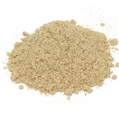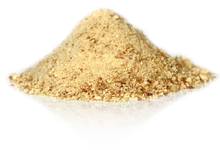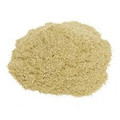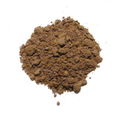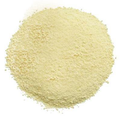 Loading... Please wait...
Loading... Please wait...- Home
- Bulk Herbs
- Herbs (A)
- Apple Pectin Powder
- Home
- Herbs - Organically Grown & Wild Crafted USA
- A-B
- Apple Pectin Powder
Product Description
Apple Pectin Powder
Also Known as Pyrus malus
Overview - Apple pectin is a type of soluble fiber found naturally in apples. Extracted pectin is commonly used to thicken jams and preserves, but can also be taken as a dietary supplement. Apple pectin is believed by some to improve digestive health and help prevent or treat gastrointestinal and metabolic disorders. When it mixes with water in the intestine, pectin forms a gel-like substance that can ease bowel movements.
Organically Grown Harvest - Onalaska, Washington State
Medicinal Uses - Pectin is a type of acid found in the cell wall of plants that is mainly composed of a sugar acid known as galacturonic acid. In its natural form, pectin is not digestible by human enzymes but can be broken down by bacteria in the gut.
When modified in the lab with chemicals like acetic acid and calcium chloride, pectin is more digestible and inferred to be more bioavailable.
Modified citrus pectin (MCP) supplements are most commonly found on drugstore shelves, but there are also apple pectin supplements that offer similar benefits.
Practitioners of alternative medicine believe that apple pectin can prevent or treat a wide range of medical conditions, including:
Colon cancer
Constipation
Diabetes
Diarrhea
Gastroesophageal reflux disease (GERD)
High cholesterol
Irritable bowel syndrome (IBS)
Metabolic syndrome
Ulcerative colitis
Despite its purported benefits, there is little solid proof that apple pectin can prevent or treat any disease. As a soluble fiber, pectin may help relieve constipation or diarrhea and improve heart health. Further research is needed.
Here is some of what the current body of research says about apple pectin.
Diarrhea: A combination of apple pectin and chamomile extract may help relieve diarrhea in children, suggests an early study in the German journal Arzneimittelforschung (Drug Research).
For this study, 255 children ages 6 months to 6 years were given either an inactive placebo or a commercial preparation called Diarrhoesan (containing 320 milligrams, mg, of apple pectin and 250 mg of chamomile extract) during an acute bout of diarrhea.
According to the investigators, the children treated with Diarrhoesan experienced greater improvement in symptoms compared to those that weren't. Although pectin may be presumed to be the cause of this, the researchers were unable to draw any conclusions as to which ingredient was more or less active.
Similarly, a 2015 study conducted at Jinling Hospital in China reported that among 87 adults with diarrhea-predominant irritable bowel syndrome (IBS-D), those given 24 grams of pectin powder per day experienced better control of their symptoms and few bouts of diarrhea over a 29-month period than those given a placebo.
Apple pectin may help lower cholesterol, according to a 2012 study in the European Journal of Clinical Nutrition. The researchers examined the effects of different types of apple or citrus pectin in people with mildly elevated cholesterol and observed that both types were able to lower "bad" low-density lipoprotein (LDL) cholesterol anywhere from 7% to 10%.
LDL cholesterol is the type that can buildup on the walls of arteries, creating obstructive plaques and contributing to the development of atherosclerosis (hardening of the arteries).
Pectin works by binding to bile in the intestines; bile is a substance that breaks down fat so that it can be absorbed into the bloodstream.
By inhibiting the breakdown of digestive fat, apple pectin may aid in the treatment of hypercholesterolemia (high blood cholesterol), although it is unlikely to do so on its own.
Herbs and Supplement to Control Cholesterol, and Diabetes: Pectin can also reduce blood sugar by binding to carbohydrates in the stomach and intestine. This helps prevent carbs from being broken down into their constituent sugars, namely glucose, fructose, and galactose.
A 2016 review from Food Standards Australia New Zealand (FSANZ) reported that apple pectin, taken in doses of 500 milligrams (mg) to 1,000 mg, offered minimum to no benefit in reducing blood sugar after eating 65 grams of carbohydrate. No changes in insulin response were noted compared to a placebo.
By contrast, pectin derived from soybeans appears to have a greater effect on blood glucose levels, albeit not enough to control diabetes on its own.
Alternative practitioners often tout apple pectin as a cancer-fighting supplement due to its ability to bind to an enzyme called beta-glucuronidase (β-glucuronidase) in the intestines. The enzyme is a byproduct of fecal bacteria and is closely associated with colon cancer.
A 2013 review in Frontiers of Pharmacology confirmed that apple pectin was, in fact, effective in suppressing β-glucuronidase in test-tube studies. Studies on rats and mice also suggest a preventive benefit. Despite the positive findings, there is no evidence that such a response can be achieved in humans.
Unlike MCP, which is readily absorbed in the intestine, the absorption of apple pectin is minimal, making its cancer-fighting properties improbable at best.
By contrast, MCP has been shown to decrease the risk of metastasis (spread of cancer) in mice by preventing the formation of new blood vessels that "feed" cancer tumors. As such, the inhibitory action of MCP occurs in the bloodstream rather than within the intestine, where apple pectin works.
Possible Side Effects: Apple pectin is generally safe to consume, although it may cause side effects such as:
Diarrhea
Gas
Stomach cramps
The side effects tend to be mild and can usually be relieved by reducing the dose.
Pectin can interfere with certain substances. It is known to decrease the absorption of beta-carotene, an important antioxidant found in colorful plants and fruits. The inadequate intake of beta-carotene can lead to vitamin A deficiency manifesting with symptoms such as dry skin, dry eyes, night blindness, impaired fertility, and an increased risk of throat and chest infection.
Pectin can also interfere with the absorption of certain pharmaceutical drugs, including:
Digoxin
Mevacor (lovastatin)
Tetracycline antibiotics
To avoid interactions, let your doctor know if you are using apple pectin, prescription drugs, or over-the-counter medications.
Dosage and Preparation:
Apple pectin supplements can be found online as well as in many natural food shops and stores specializing in dietary supplements. Most are sold either in capsule form or as a powder that you can mix with water or juice.
There are no guidelines for the appropriate use of apple pectin, although most manufacturers typically recommend a daily dose of between 1,000 to 1,400 mg per day. It is best taken 30 minutes before a meal so that it will be available to bind with excess water, fat, or carbohydrates in the intestine.
Start with half doses of apple pectin for the first few weeks, gradually increasing them as tolerated. The excess use of pectin can cause diarrhea, particularly in the early stages of treatment.
Dosages of between 350 and 750 mg, taken in split doses, have been used safely in children. Speak with your pediatrician before using apple pectin (or any other antidiarrheal remedy) in children.
Disclaimer - These products are not intended to diagnose, treat cure or prevent any disease. Reviews are not intended as a substitute for appropriate medical care or the advice of a physician or another medical professional. Actual results may vary among users. Mountain Maus Remedies LLC makes no warranty or representation, expressed or implied, as to the accuracy or validity of the information contributed by outside product review submissions, and assumes no responsibility or liability regarding the use of such information. The information and statements regarding the dietary supplements have not been evaluated by the Food and Drug Administration. If you have a medical condition or disease, please talk to your health care provider. If you are currently taking a prescription medication, you should work with your health care provider before discontinuing any drug or altering any drug regimen, including augmenting your regimen with any herb or dietary supplements. Do not attempt to self-diagnose any disease or ailment based on the reviews and do not use the information contained herein for diagnosing or treating a health problem or disease. Proper medical care is critical to good health. If you have a health concern or suspect you have an undiagnosed sign or symptom, please consult a physician or health care practitioner.
© Mountain Maus Remedies. All Rights Reserved








